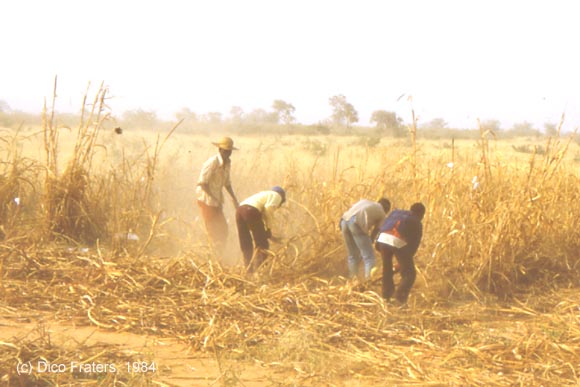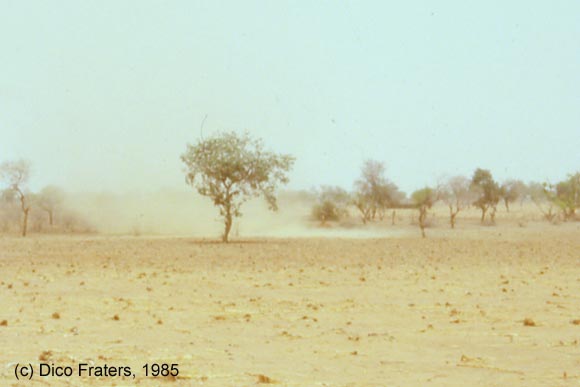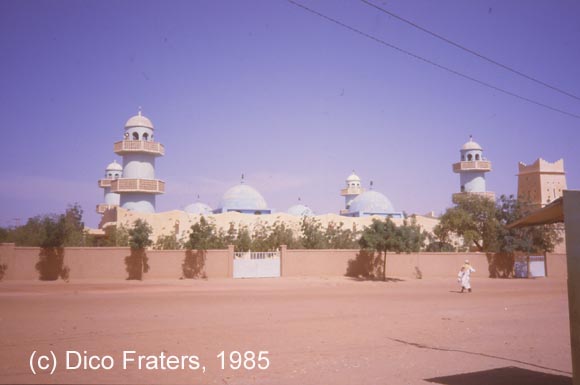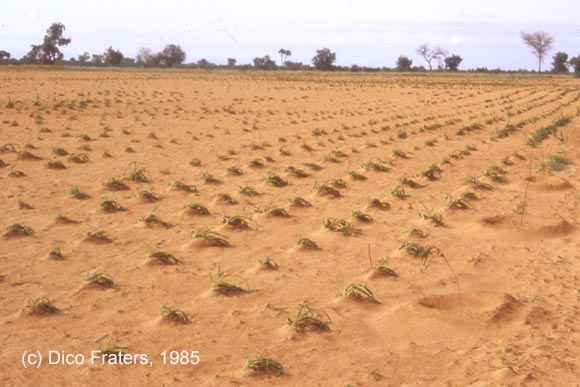|
Lesson
15. Abdou sanni no |
|
Content
-
Intro
- Vocabulary
-
Practical idiomatic winks
- Grammar
-
Exercises
|
|
| 15.A. Intro
Zarma are mainly farmers. Agriculture in Niger
is largely subsistence farming. That is, farming
is a way of life rather than a profession like
in Europe. Millet is the main crop. Millet,
sorghum, rice (grown on the banks of the Niger
river) make up the staple crops. Cotton,
tobacco, cowpea, and peanuts are raised as cash
crops. The head of the household distributes
fields to each of the family members for
cultivation. Men are responsible for clearing,
sowing, weeding, and harvesting the millet.
Women, in addition to their domestic tasks, help
in the sowing and harvesting of millet and are
also responsible for small plots of peanuts,
okra, and peas. They will also plant and tend
dry-season gardens in areas with access to
water. During the growing season, the animals of
the Zarma are generally given to Fulani herdsmen
who take care of them against payment in kind or
in exchange of land. The mutual dependence
between Zarma and Fulani has created a highly
complex agro pastoral system in Southwest Niger.
The text below is a part of the story of the farmer Abdou.
He describes his and his families farming
activities during a the year. The Zarma
distinguish four seasons: hayni, the hot,
dry season, kaydiya, the raining season,
hemar, the harvest season, and jaw
(hargu), the cold, dry season. Each
season demand different activities. In this part
you can learn about the agricultural activities
during hayni and the start of
kaydiya.
Source of Abdou's story:
Jackson Neisse and Noelle Smith (1995)
Sources and further
information on the web:
Furber (1997),
Neef (2000),
Zermateam,
Joshuaproject
Abdou sanni no
| Part 1 |
|
| Hayni kan wayno ga
futu gumo, iri sintin ga
zoru
. Iri ga
hayni kwaari ton, iri ma fari
hanse ma bori. Iri ga kwaarey kar.
Iri ga hangan kala
korsolo
ma ka. |
 |
| |
| Alhamdulilahi. Nda
Irikoy ma saye te, kaydiya
ma
tar
ga ka. Hala hari ga kaŋ, iri
ga koy fari ga di hala
laabu tay
ga bori. Nda a ga sundu
kambe fatta kuyan laabu ra, a wasa
ga
duma. |
| |
Iri ga kwaarey
kar, iri sintin ga zuru. |
| Borey go no kan i ga duma ba
haro man ma gumo. Amma borey kulu si bay hala
a ga te
ya cine.
Ay bumbo ga hangan hala haro
ma gumo ga duma. |
|
| |
 |
| Han fo kan iri ga koy fari
ga duma, ay wande, Haoua, nda
ay izey kulu ga ka ay banda. Ay ga
duma
kaa nda
kalma. I ga ay gana ga daŋ kambe-ize hinza hayni
teejiizey
bungey kulu ra. I ga i taamu nda ngey ce. Iri ga
sobay ga koy ya cine
kala fari kulu ma ban. |
| |
Haro man ma
gumo. |
| Part 2 |
|
| Nda Irikoy ma yedda, hayni ga zay jirbi hinza ga
koy itaci [2] banda.
I ga n' a se hayni buzugu. Hatta-hatta nda haro si tar
ga ka, nda a ga gay gumo, kwaara borey kulu
ga koy jingara do ga jingar Irikoy se a ma
kande hari. I ga te alfatiya Irikoy se a
ma kande hari. |
 |
| |
| Kaydiya waate,
borey kulu pat ga goy. Susubey alcirikaaray banda ay
ga koy fari nda ay izey, Bachirou nda Himu. Iri ga goy kala alula to. |
| |
borey kulu
ga koy jingara do |
| Ay wande, Haoua, nda ay izo
Binta ga kand' iri se
donu kan
zaaro to. Iri fari si kala kilometter
hinza nda Bongu Jinde. A ga moru. Wodin se iri ga ne: kadiya goy beri
lookaci
no. |
|
| |
 |
| Hayni dumi
hinka go no. Hayni cire
go no. A ga tar ga beri jirbi
75
ga koy
jirbi 100 ra. Nda afo koyne: sumno. A si tar ga beri amma a
ga te hayni ibobo. A si te kala jirbi 120 ga
koy 180 kala a ma hay. Hayni cire
koptey gonda hamni bobo i ga. |
| |
Hayni ga zay. |
Source:
Jackson Neisse and Noelle Smith (1995)
After answering the
questions, you can read the
translation here.
Questions to practice your reading
skills
- Ifo se no borey kulu ga koy jingara do?
- Hayni dumi marge go no?
Answers
- xxx
- xxx
If you like to see things
for yourself, there are two photo
sessions showing all farming activities
regarding raising millet.

|
|
15.B.
Vocabulary
- Verbs
- Nouns
-
Adjectives, adverbs, etc.

Learn these words by heart.
Extra
Move the mouse to one of the underlined words and a sentence in which the word is used will appear. Click the left mouse button and a photo will appear in a popup.
When you move the pointer on the screen with your mouse over the photo the translation of the Zarma sentence will show.
|
|
15.B.1
Verbs
|
Zarma |
English |
Pronunciation |
|
dangey |
to
be quiet, to be still, to hush |
dan / gey |
|
garaw |
to
loan |
gà / raw |
|
garaw sambu |
to
borrow money, take up a loan |
gà / raw
sam / bu |
|
garaw bana |
to
repay a loan |
gà / raw
ba / na |
hi
hi ... se
hi ... ga |
to
lend, to borrow [same object to
be returned]
to lend to
to lend from |
hi |
|
di |
to catch, to lay hold of, to
seize
|
di |
|
turu |
to
dress hair |
tu / ru |
|
sufurey |
to
rent, to hire |
su / fu rey |
|
daabu |
to
cover, to close, to shut |
daa / bu |
|
suban |
to
choose, to select, to elect |
su / ban |
|
nin |
to
be ripe, to be cooked |
nin |
|
windi |
to
go around, to encircle |
win / di |
|
hin |
to
be able to, can [with compound
verb] |
hin |
|
no ya |
is,
are [emphatic] |
no ya |
|
ho |
to
intend, to plan, to think, to
expect, to purpose [also
pronounced as "haw"] |
hô |
|
maray |
to
injure, to be wounded, to be
hurt, to be injured [not to feel
pain] |
ma / re |
|
tamaha |
to
suppose, to think |
ta / ma ha |
| ye |
to
put back, to give back, to
restore; to be healed |
ye |
|
|
Note:
# signifies verb that take the direct object afterwards, see Lesson 2.C.1 & 3.D.5
Back |
|
15.B.2
Nouns
|
Zarma |
English |
Pronunciation |
|
wandiyo, wandiya
|
adolescent girl [literally:
virgin], unmarried woman [that
is never was married], girl
friend, fiancée |
wan / di yo,
wan / di ya |
|
garaw, garawa |
a loan, a debt |
gà / raw |
|
hamni, hamno |
hair, feather, fur |
ham ni |
|
boŋ hamni, boŋ hamno |
hair of head |
boŋ ham ni |
|
nangu, nango |
place |
nan / gu |
|
dabirji, dabirjo |
cover, lid |
da bir ji |
|
kunta |
blanket, coverlet |
kun ta |
| kasu,
kaso |
jail |
ka / su |
|
danfane, danfano |
small common lizard |
dan / fa ne |
|
handu, hando |
moon;
month |
han / du |
|
windi, windo |
fence encircling an area,
compound enclosed by such a
fence or wall |
win / di |
| hina |
ability, the authorities or the
government |
hi na / |
|
|
Back |
|
15.B.3
Adjectives, adverbs, etc.
|
Zarma |
English |
Pronunciation |
|
wone (demonstrative adjective) |
this one here |
wo / ne |
|
mannaŋ (adverb) |
last year |
man / naŋ
[nasal] |
|
yeesi (adverb) |
next year |
yê / si |
|
doŋ (adverb) (1) |
of old, formerly |
do ŋ |
neya (adverb)
Nga neya ! |
right here [emphatic]
Here it is ! |
nê ya |
(1) In Lesson 10 we have
already had the conjunction "doŋ",
meaning "then, in that case".
|
|
Back
|
|
| 15.C
Practical idiomatic winks The following
two topics are discussed:

Ye
(Lesson 15:
to put back, to give back, to
restore)
The word "ye", besides being a verb in
its own right, when used with the verb-link "ga"
(or "ka") and another verb, gives repeated action to the
second verb (again) or indicates that something
is returned (back). Examples below show how this is
done, though this form cannot be used with all
verbs.
Examples
|
Second verb |
Combination with ye ga |
| Zarma |
English |
Zarma |
English |
| kaa |
to come |
ye ga kaa |
to come again, to return, to
come back |
| ci |
to tell |
ye ga ci |
to tell over again, to
repeat |
| |
|
ye ga kaa ga ci |
Come to retell |
| te |
to do |
ye ga te |
to do again, to repeat an
action |
| ha |
to ask |
ye ga ha |
to ask again |
| maray |
to be injured |
ye ga maray |
to be injured again |
| jisi |
to place, to put |
ye ga jisi |
to place back, to put back |
Sometime ye ga is used
with a noun [in some cases a gerund] to give
this repeat idea:
ci [to tell] ► ciyan
[communication] ► ye ga ciyan [repetition]
The word ye with a noun
only gives an idea of returning
bande [back, rear (side)] ► ye
bande [go back(wards)]
In
section D.2 of this lesson others uses of
the verb-link "ga" are discussed.
Back
Ba (lesson
5: to
like, to love, to desire, to want; to be
abundant, numerous,
a lot)
The Zarma verb ba has several
meanings. You may use it to say you like or
prefer something or like of love someone.
Examples
|
Zarma |
English |
| Ay ga ba nin. |
I like you. |
| Ay ga ba nin. |
I love you |
|
Feji nda hincin, wofo ni ga ba? |
Which do you prefer a sheep
or a goat |
The verb can also be used to say you desire or
want something or you want something to do or to
be done. Of course you may also use in a
negative form.
Examples
|
Zarma |
English |
| Tira hinka go ne. Wone n' ay ga ba. |
Two books are here. It is this one I want. |
| Tira hinka go ne. Wone n' ay ga ba. |
Two books are here. It is this one I
desire. |
| Ay ga ba ay ma
koy fu suba. |
I want to go home tomorrow
Literally: I want that I go home
tomorrow. |
| A si ba nga izo
ma goy ne. |
He doesn't want his child to
work here. |
Action about to take place
The idea of
"to be about to" do something is shown be using "ga ba
ga" as auxiliaries before the verb.
Examples
| Zarma |
English |
| Bariyo ga ba
ga bu. |
The horse is about to die. |
| Hari ga ba
ga kaa. |
It is about to rain. |
| Iri jaw kala iri ga ba
ga bu. |
We were so thirsty we
about died. |
| Ŋwaro ga ba
ga ban. |
The food is about all gone (finished). |
Back
|
|
| 15.D.
Grammar
Subjects in this lesson:
-
Imperfect and past progressive tenses
-
Verb-link conjunction for compound verbs
and infinitives
-
Common expression and exclamations
|
|
|
15.D.1 Imperfect and past progressive
tenses
1. Imperfect tense
As we saw
several lessons ago, the particle "ga"
is used with the non-completed action aspect
of the verb. Often the actual time comes
from the context, whether simple present or
future. Therefore, this is the particle for
use in the non-completed action aspects.
With repeated or habitual action in the
past, where you got the time from elements
in the sentence, it can be translated by our
"used to" or "would".
Examples
|
Zarma |
English |
| Manan Musa ga kande
iri se gunguri watikulu, amma ay mana di a
haraŋ. |
Last year Musa would
bring us eggs all the time, but I
haven't seen him this year. |
| Jirbeydin ra zankey ga
kaa ne watikulu. |
In those days the children
used to come here all the time. |
| Watodin a ga ne iri ŋwaro ga
kaan nga se, amma sohon a si kaa iri do
koyne. |
At that time he used to say
our food was pleasing to him, but now he
doesn't come to us any more. |
2. Progressive or continuous past
We saw in
Lesson 5 that certain auxiliaries are
used with the verb to form progressive or
continuous present. Exactly the same forms (go
no ga and go ga) are used to form
the progressive or continuous past.
Examples
| Zarma |
English |
| Watokan i kaa bi, a go
no ga tirey hantum. |
When they came
yesterday, he was writing letters. |
| Nango kan a ra ni goy
mannaŋ, i go ga ni bana, wala? |
Where you worked last
year, did they pay you (regularly)? |
| A bina sara hal' a ga ba
ga hen. |
She was so sad that she
was about to weep. |
Back
|
|
| 15.D.2. Verb-link conjunction for
compound verbs and infinitives We have
already studied the conjunction "nda"
which connects substantives, and the conjunction
"mo" to connect clauses. The conjunction
that connects verbs is "ga" (Zarma) or "ka"
(Songhay). It is a very short
sound. Ga sounds like the combination of
the "g" in "give" and the "a" in "cinema".
Ka sounds like first syllable of the English word
"canal". It is sometime pronounce as "ha"
(Songhay Wodo)[1].
The verb-link conjunction is never accented or drawn out. It
can connect a verb and all its modifiers, always
provided the subject and tenses do not change,
nor the mood.
The conjunction "ga" can contract with
the direct object as "na", "ga",
and "ma" do. With certain verbs the
verb-link "ga" will come out in translation as
an infinitive, rather than as a compound verb.
Ordinarily the infinitive is formed with the
particle "ma" having a separate subject,
but the "ga" is used with certain verbs.
Examples
| Zarma |
English |
| A kaa ga ŋwa. |
He came and ate. |
| A kaa zama nga ma ŋwa. |
He came to eat. |
| I goro ga hantum. |
They sat down and wrote. |
| Iri n' a di g' a wi. |
We caught it and killed
it. |
| Ay maa zanka fo kan go no
ga hen ga ne a se a ma dangey. |
I heard a child who was
weeping and said to him he should hush. |
The verb "koy" (to go) can be -not
must- an exception in that it can be used
directly before another verb for a compound
predicate.
Examples
| Zarma |
English |
| Koy ci a se a ma kaa. |
Go and tell
him to come |
| Koy ga ci a se a ma kaa. |
| Suba ay ga koy di. |
Tomorrow I
will go and see. |
| Suba ay ga koy ga di. |
The verb "ba" (to like, etc.)
never forms an infinitive with the particle
"ga", but always with "ma", as
in
Lesson 10. The combination "ga ba
ga"
plus verb means uniformly "to be about to
..." (see
above).
There are several other uses of the link
auxiliary "ga", as we have seen in
part C of this lesson. With the following
verbs one can form
an infinitive or a gerund phrase.
| To form an
infinitive |
|
combination with "ga" |
examples |
| hima ga |
to ought to |
A ga hima g' a te. |
He ought to do it. |
| ho ga |
to plan to |
Iri ho ga koy. |
we planned to go. |
| sintin ga |
to start to |
Sintin ga koy. |
Start to go. |
| du ga |
to get to |
Araŋ du ga don. |
You got to sing. |
| wani ga |
to know how to |
Ay ga wani ga hanse moto. |
I know how to repair a car. |
| hin ga |
can |
A ga hin g' a te. |
He can do it. |
| si hin ga |
can't |
Ay si hin g' a te. |
I can't do it. |
| To form a gerund
phrase |
| ga ban |
to finish |
A g' a hanse ga ban. |
He will finish fixing it. |
| ga tonton |
the more |
I zuru ga tonton. |
They ran the more. |
| gay ga |
to delay |
Ni gay ga kaa |
you delayed coming |
Back
|
|
| 15.D.3. Common expressions and
exclamations You 'll find here a list of
useful idiomatic expressions and exclamations.
Examples
| Zarma |
English |
| Madala ! |
That's wonderful !
literally: Praise the Lord ! |
| Alhamdulilahi ! |
Praise be to God ! |
| Ni ga cim ! |
You' re right ! |
| Jam ! |
That's too bad ! ; How
awful !
[remonstrance] |
| Haba? |
Oh yeah? ; Is that right?
; Is that so?
[exclamation of doubt, incredulity] |
| Kay ! |
Uch ! , Yech ! ,Yuck ! ;
Mind !
[exclamation of disgust, disapproval,
surprise, warning] |
| To ! |
O.K. ! ; Check ! ; Well !
[expression of attention, agreement,
satisfaction] |
| Hay fo ! |
Say you ! ; Hey there ! |
| Gasa ! |
Brother ! ; (rare: for
crying out loud) |
| Wi za ! |
What do you know ! ; Low
and behold, honestly !
As a matter of fact .... |
| Dahir ! |
Truly ! , of a truth |
| Wey ! |
Ouch ! |
| Na'am. |
Yeah
[man 's answer on being called] |
| Yu ! |
Yeah
[woman's answer on being called;
pronounced rising infliction on this and
preceding] |
Back
|
| |
| |
|
 |
|
Last updated:
11 maart 2012
|
|
|
|